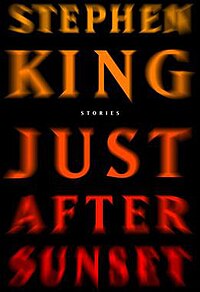"The things I want to tell you about--
the ones they left behind--showed up
in my apartment in August 2002. I'm sure
of that, because I found most of them
not long after I helped Paula Robeson
with her air conditioner. Memory always
needs a marker, and that's mine."
 It would be a total fault not to include Stephen King in a celebration of National Short Story Month since he is one of the working masters of the short story. Any number of his stories could be selected, but the reasoning for the selection of his story "The Things They Left Behind" are these: 1) It's one of King's more recent works, and she thinks, shows more his abilities than some of his recent longer works; and 2) it's one of the few creative works to deal with 9/11 in a smart and cathartic manner.
It would be a total fault not to include Stephen King in a celebration of National Short Story Month since he is one of the working masters of the short story. Any number of his stories could be selected, but the reasoning for the selection of his story "The Things They Left Behind" are these: 1) It's one of King's more recent works, and she thinks, shows more his abilities than some of his recent longer works; and 2) it's one of the few creative works to deal with 9/11 in a smart and cathartic manner.As with any of King's work, it is difficult if not impossible to find online; even when magazines publish King, his work is available only to those who have paying subscriptions to that magazine (and as well it should be, regardless of who the writer is). "The Things They Left Behind" is from King's collection Just After Sunset, and the title links to the story via the Google Preview for the collection.
by Stephen King
(2008)



![Newspaper article where The Tell-Tale Heart first appeared The New York Sun. [From the Pioneers.] The Tell-Tale Heart. By Edgar A. Poe. Art is long and Time is fleeting, And our hearts though stout and brave, Still, like muffled drums, are beating Funeral marches to the grave. [Longfellow. Then text of story begins.](https://blogger.googleusercontent.com/img/b/R29vZ2xl/AVvXsEi0A6rP0oD0wX-3X9YU8E1H-Ae38Ql7l7WIPWE5DAl0Kyj4ODhHlrFEKfXt61I0TmRyvetcziDeTSnY3LzRVQANRfPf48dvDLBUz1kZ5GG_0UyA1UeLoMJS0wJ__JfWIqLFo4hGc-2KUDI/s1600/tell-tale+heart.jpg)


